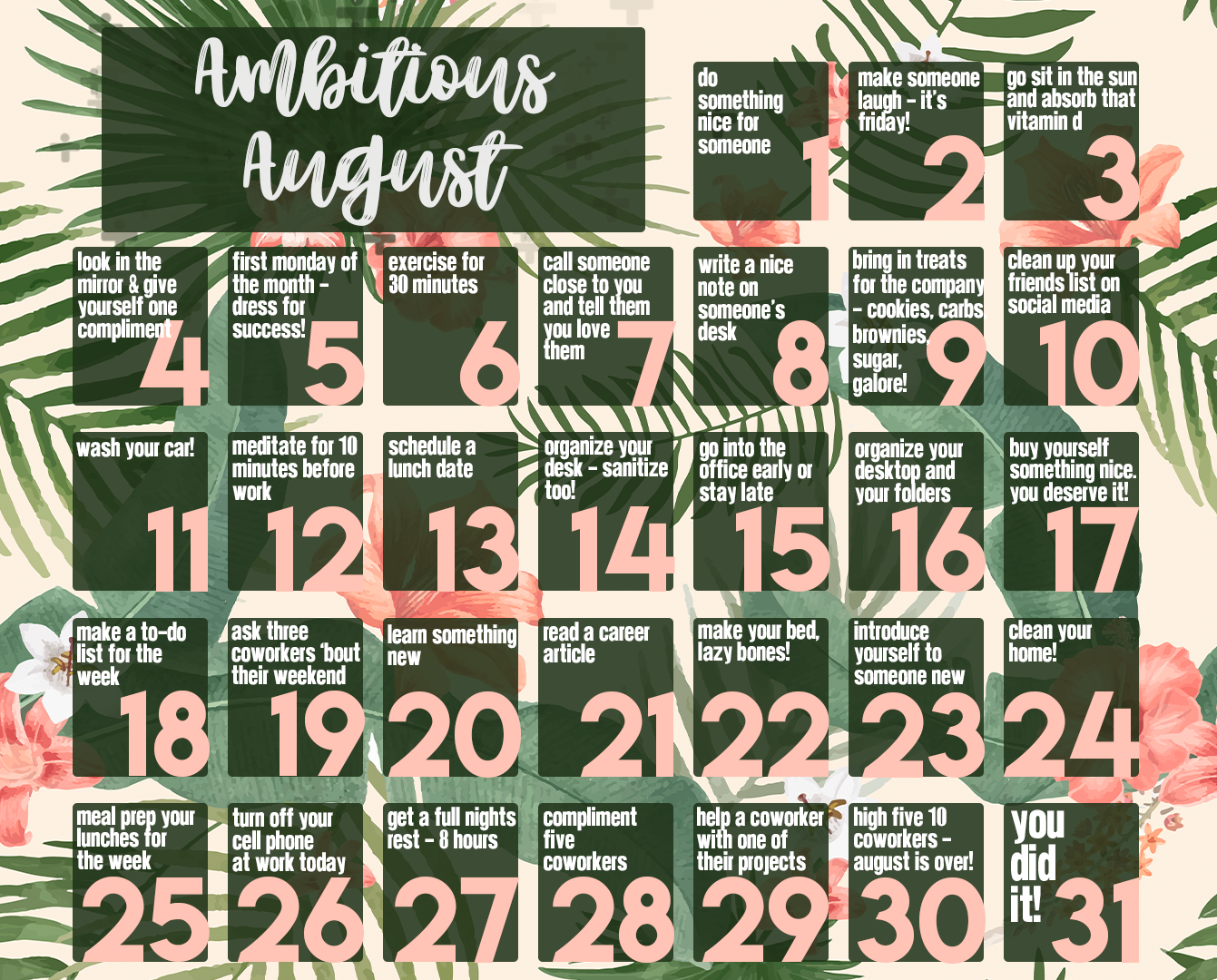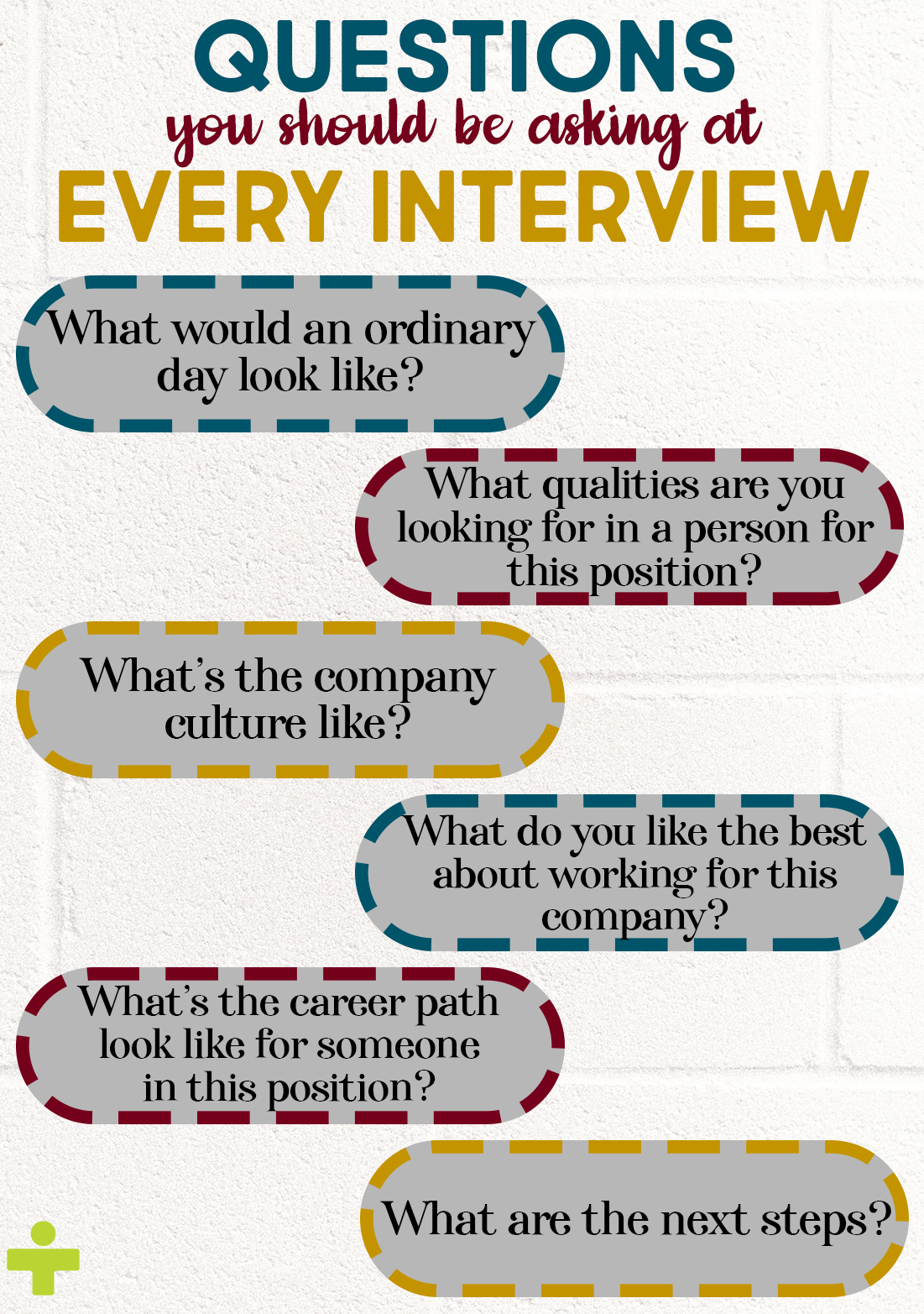
August 1st – “Do something nice for someone.” Not only will it make them feel good, but it will make feel good too!
August 2nd – “Make someone laugh – it’s Friday!” A big stress reliever is laughing and a study shows that people will like you more if you make them laugh.
August 3rd – “Go sit in the sun and absorb some Vitamin D.” Vitamin D promotes bone growth, reduces depression, promotes weight loss, and fights diseases! Why wouldn’t you want to be lounging around in the sun with all those health benefits? But, don’t forget to wear sunscreen!
August 4th – ” Look at yourself in the mirror. Give yourself one compliment.” You can either be your own biggest fan or your own biggest enemy. By complimenting yourself, builds confidence and positivity within yourself.
August 5th – “It’s the first Monday of the month! Dress for success.” Dressing professionally demands respect and it also builds your self-confidence. It’s also fun to know you look great!
August 6th – “Excercise for 30 minutes.” This can be going for a walk during your lunch, going to yoga, and everything in between! Get up and be active – there are so many health benefits to working out.
August 7th – “Call someone close to you – someone you love. Express your gratitude towards them, tell them you love them or thank them for being there for you.”
August 8th – “Write a nice note on someone’s desk.” This brightens up people’s day and freshens up the office environment.
August 9th – “Bring in some treats for the company.” Get your ‘Martha Stewart’ on and bake some cookies, brownies, or cupcakes! Or bring in some yummy carbs and goodies for everyone to chow down on.
August 10th – “Clean up your friends’ list on social media” Still friends with those annoying, popular girls from high school? Just unfollow them – you’ll feel less anxiety logging on without seeing all their posts about “joining their pyramid scheme”.
August 11th – “Wash your car.” There’s nothing better than a squeaky clean ride! Just cross one more thing off of your list.
August 12th – “Meditate ten minutes before coming into work” Get your mind focused and relax before the worries of work sink in.
August 13th – “Schedule a lunch date.”
August 14th – “Organize your desk – sanitize too!” You should be organizing and ridding your desk of germs, at least, once a month. Not only does this help you avoid illnesses, but it also reduces stress by not having to deal with a messy desk. Messy desks make for messy minds!
August 15th – “Go into the office early or stay late.” Think of all the work you can get done by spending a little more time in the office.
August 16th – “Organize your folders on your desktop.” Get rid of folders or documents you don’t need anymore to clear space up on your computer.
August 17th – “Buy yourself something nice – you deserve it!” Everyone deserves a little splurging every now and then.
August 18th – “Make a to-do list for the week.” Reach out to this partner on Monday, clean your bathroom on Tuesday, finish that project by Wednesday… Write down everything you want to get done within the week – personal and professional.
August 19th – “Ask three coworkers about their weekend.” And actually listen.
August 20th – “Learn something new.” Knowledge is power!
August 21st – “Read a career article.”
August 22nd – “Make your bed, you lazy bones!” Navy Seal William H. McCraven, commander of the forces that led the raid to kill Osama bin Laden, told the 2014 University of Texas graduates, “If you want to change the world, start off by making your bed. If you make your bed every morning, you will have accomplished the first task of the day. It will give you a small sense of pride, and it will encourage you to do another task, and another, and another. And by the end of the day that one task completed will have turned into many tasks completed.”
August 23rd – “Introduce yourself to someone new.” The more friends the merrier!
August 24th – “Clean your home.”
August 25th – “Meal prep your lunches for the week.” Start your week off right with healthy lunches!
August 26th – “Turn off your cell phone today.” Don’t let the hundreds of notifications distract you from your work.
August 27th – “Get a full nights rest.” A whole eight hours of sleep? Unheard of! Well, not tonight…
August 28th – “Compliment five coworkers.” Compliments are nice to receive but even better to give. Tell someone how much you love their hair or their outfit! You could turn around someone’s awful day to somewhat bearable.
August 29th – “Help a coworker with one of their projects or responsibilities.” Help out some of your coworkers that are stressing over certain projects, they’ll appreciate it.
August 30th – “High-five 10 coworkers.” August is over, time to celebrate the coming of a brand new month.
August 31st – “End the month doing three of your favorite things you did this past month from the list above.” You’re ending the month & starting the new month as productive as ever!






